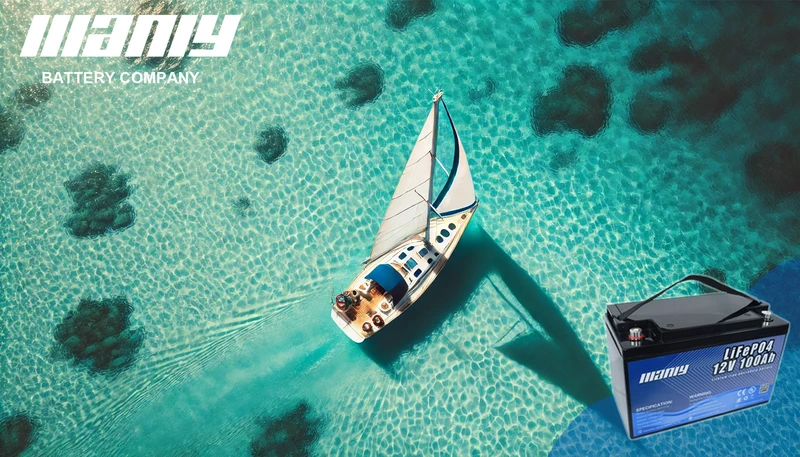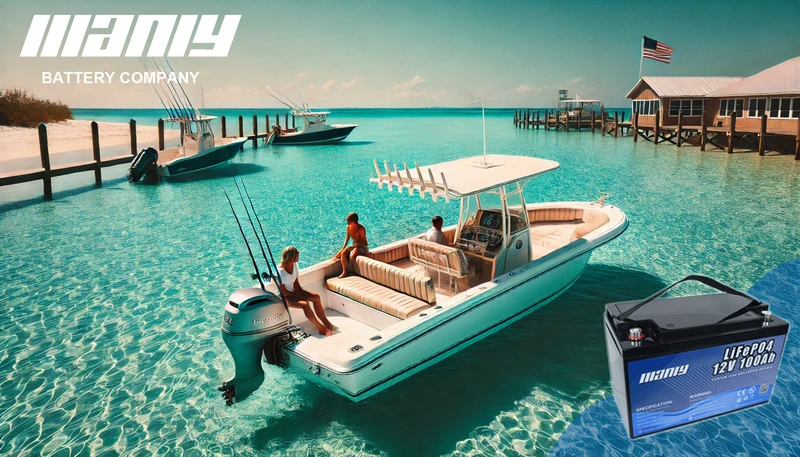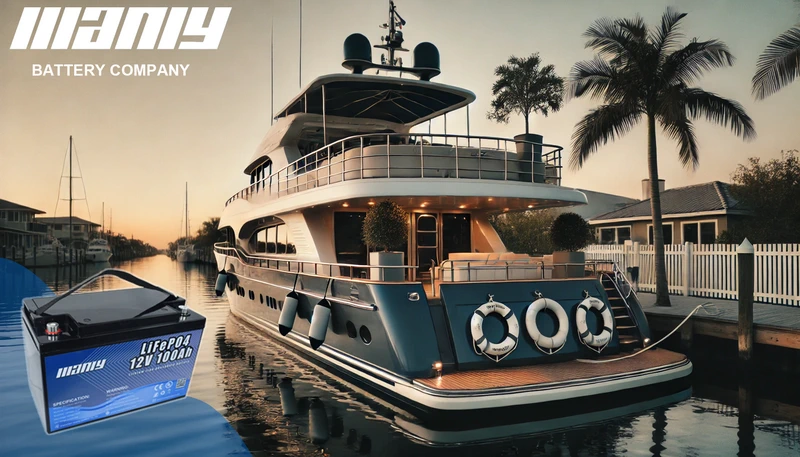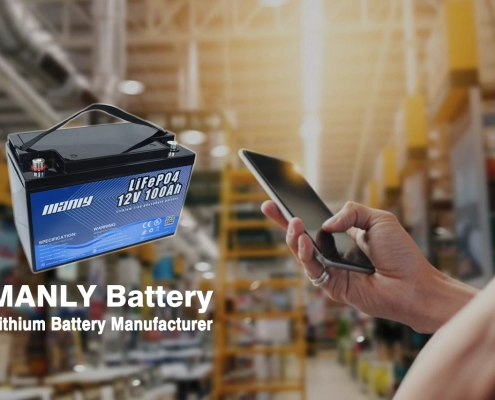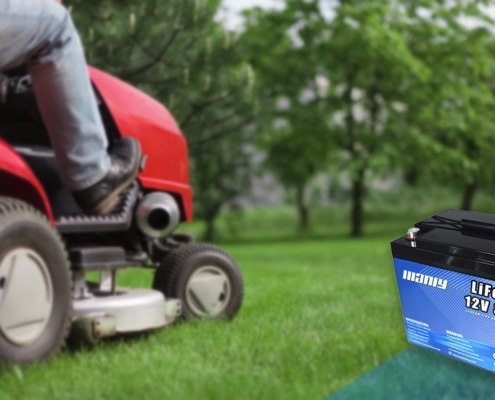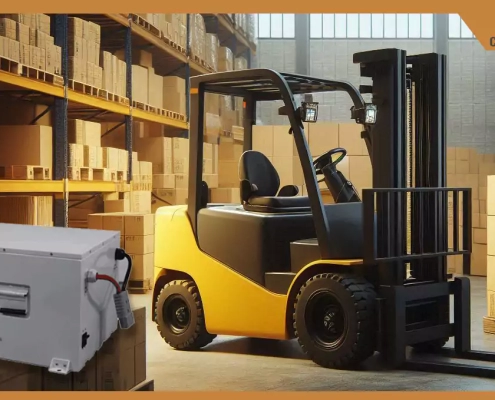Are Lithium Batteries Good For Boats
Table of Contents
- Are Lithium Batteries Good For Boats
- Lithium vs. Lead-Acid: Key Differences Every Boater Should Know
- The Essential Elements of Lithium Batteries: Understanding Amps, Voltage, and Capacity
- How to Choose the Right Setup: Series vs. Parallel Configurations for Your Boat’s Battery System
- Important Considerations When Using Lithium Batteries on Boats
- Top Tips for Extending the Life of Your Lithium Marine Batteries
- Is Switching to Lithium Batteries the Right Move for Your Boat?
- How Easy Is the Upgrade Process?
- Safety Concerns with Lithium Marine Batteries: What You Need to Know
- What’s the Cost of Switching to Lithium Marine Batteries?
- Conclusion
- FAQ:
- Hot Search
- Learn More About Battery
Choosing the correct battery for your boat is more than just a technical decision—it’s about ensuring reliability, performance, and peace of mind. Lithium batteries, known for their reliability, are quickly becoming the go-to choice when it comes to powering your boat, and for good reason. But with so many options out there, how do you know if lithium is the right move for you? In this article, we will explore the key differences between lead acid and lithium batteries, helping you understand what makes lithium such an attractive option for boaters. Whether you’re looking to upgrade your current setup or make your first purchase, we’ll break down the benefits, considerations, and things you need to know before making the switch. Let’s dive in!
Lithium vs. Lead-Acid: Key Differences Every Boater Should Know
Choosing the correct battery can make or break your experience when powering your boat. So, what’s the deal with lithium boat batteries vs. lead-acid batteries? Let’s dive into it, shall we?
1. Exploring Power Differences
The difference in power between lithium batteries for boats and lead-acid batteries is enormous. Lithium batteries pack way more punch in a smaller, lighter package. Imagine getting more energy without the extra weight—that’s precisely what you get with lithium boat batteries.
Here’s the kicker: lithium batteries boast a far higher energy density than their lead-acid counterparts. Lithium batteries store much more energy per unit of weight. For example, a lithium battery can provide 150-200 watt-hours per kilogram (Wh/kg), whereas a lead-acid battery maxes out at about 30-40 Wh/kg. So, when you go with lithium boat batteries, you’re saving weight space and boosting your boat’s efficiency—everything you need for smooth sailing.
2. Efficiency Comparison
But it’s not just about power. Lithium batteries for boats are more efficient at charging and holding a charge. Lithium boat batteries charge up quickly and last longer than lead-acid batteries.
How’s that for convenience? While lead-acid batteries tend to lose voltage as they discharge—making them unreliable as they approach their end of life—lithium batteries maintain a steady voltage throughout most of their discharge cycle. This means your gear will keep running smoothly for much longer, so you don’t have to worry about losing power halfway through your trip.
The Essential Elements of Lithium Batteries: Understanding Amps, Voltage, and Capacity
You must understand key concepts: amps, voltage, and capacity to get the most out of your lithium boat batteries. These factors play a huge role in how much power your battery can store and deliver, and understanding them is the first step in choosing the correct lithium battery for boats.
1. What does amp hour mean for your boat battery?
An amp hour (Ah) is one of the most critical metrics. It tells you how much energy your battery can store and how long it can power your boat’s equipment. A 100Ah lithium battery can provide 1 amp for 100 hours, two amps for 50 hours, and so on.
The larger the Ah rating, the longer your battery will run. If you need longer power runs—for instance, for your fish finder, trolling motor, or lights—consider a lithium battery with a higher Ah. It’s a simple but critical factor directly impacting how long you can stay on the water.
2. The Role of Voltage in Battery Performance
Voltage is the measure of power. A higher voltage means more power can be delivered, which is crucial for larger systems requiring much juice. For instance, if you’re running a sizeable trolling motor, you might need a 24V or 36V lithium battery system. Lithium boat batteries allow you to choose between different voltages to suit your boat’s power needs.
Also, lithium batteries perform better across a range of voltages, providing more stable, reliable power than lead-acid batteries, whose voltage drops noticeably as they discharge. This makes lithium batteries a much more dependable choice for longer trips.
How to Choose the Right Setup: Series vs. Parallel Configurations for Your Boat’s Battery System
Once you understand amps and voltage, it’s time to decide how you’ll wire your lithium boat batteries. Should you go with a series setup or parallel? Here’s the rundown.
1. What you need to know about wiring configurations
- Series Configuration: This is how you increase the voltage. When you wire two 12V lithium batteries in series, you get a 24V system. This is ideal for high-powered systems, like large trolling motors, or if you need more performance.
- Parallel Configuration: Connect the batteries in parallel if you need to increase capacity (meaning how long the battery lasts, not how powerful it is). This keeps the voltage unchanged but doubles the amp hours, giving you more runtime. So, if you’re not looking to change your boat’s voltage but need longer-lasting power, parallel is your go-to.
2. Advantages and Disadvantages of Each
- Series Configuration: Increases voltage, great for high-powered systems, but requires you to be mindful of the balance between batteries.
- Parallel Configuration: Increases capacity, great for more prolonged use, but you need extra space for the additional batteries, and they must all be the same type and age to ensure efficiency.
Important Considerations When Using Lithium Batteries on Boats
When switching to lithium boat batteries, there are a few things you need to keep in mind to maximize their performance and lifespan. The marine environment is harsh, and your battery setup must be prepared for it.
1. Freezing temperatures and their effects
Lithium boat batteries aren’t fans of the cold. While they can operate in cooler temps, charging them in freezing conditions is a big no-no. Charging in cold temperatures can cause condensation inside the battery, which could lead to damage.
The solution? If you live in a colder climate, store your lithium batteries indoors or in a warm space during winter. Most lithium batteries can handle temps as low as 23°F, but prolonged exposure to freezing conditions can shorten their lifespan.
2. Dealing with moisture in marine batteries
Water and electricity don’t mix; moisture can damage lithium batteries over time. Look for lithium boat batteries with a high Ingress Protection (IP) rating, such as IP67, to ensure they’re water—and dust-resistant. A sealed, waterproof battery can help prevent corrosion and shorts, common issues when dealing with marine batteries.
3. Avoiding deep discharge: why it matters.
While lithium batteries are much better at handling deep discharges than lead-acid batteries, it’s still a good idea to avoid letting them drain completely. Most lithium boat batteries have a Battery Management System (BMS) that prevents deep discharges by automatically shutting the battery off when it gets too low. But even with this technology, consistent deep discharges will still degrade the battery’s performance over time.
4. Maximizing battery lifespan with proper charge cycles
When it comes to extending the lifespan of your lithium boat batteries, the key is in how you charge them. Avoid going from 0% to 100% every time. Lithium batteries last longer when they’re kept between 20% and 80% charge. If you don’t need all the power, don’t top it off—this helps avoid unnecessary wear and tear on the cells.
Lithium boat batteries can offer reliable, long-lasting performance if you consider these key elements and make the right choice for your boat’s power needs. Ready to upgrade your boat’s battery system? Dive in and see how lithium boat batteries can take your on-water experience to the next level!
Top Tips for Extending the Life of Your Lithium Marine Batteries
Proper practices can make all the difference in maximizing the lifespan of your lithium boat batteries. Whether you enjoy the open water or store your batteries during the off-season, following these essential tips will help you get the most out of your lithium batteries for boats.
1. Proper Charging Practices
Charging your lithium boat batteries correctly ensures they last as long as possible. Lithium batteries don’t suffer from memory issues, unlike lead-acid batteries, so you don’t need to fully discharge them before recharging. Keeping your lithium batteries within the optimal charge range of 20% to 80% is key—this practice significantly extends their lifespan. It’s important to avoid deep discharges or overcharging. For example, letting your battery drop below 20% can trigger the Battery Management System (BMS) to activate sleep mode, requiring a special charger to wake it up.
Using a high-quality charger designed for lithium batteries is equally essential. An incompatible charger can overheat or damage the battery, so make sure the charger’s voltage and amperage match the battery’s specifications. Doing so helps maintain the correct charge cycle, which is crucial for battery health.
2. Storage and Maintenance During Off-Seasons
When it’s time to store your lithium boat batteries for the off-season, choose a fabulous, dry location; extreme temperatures—whether hot or cold—can negatively impact the battery’s internal components, reducing its lifespan. For optimal storage, maintain a temperature between 0°C and 20°C. Keeping your batteries indoors or in an insulated space is your best bet.
Another critical step is charging the battery to about 50% before storage. Storing fully charged or completely discharged batteries can shorten their life, but by charging them to 50%, you help preserve their overall health and ensure they’re ready when the boating season rolls around.
Is Switching to Lithium Batteries the Right Move for Your Boat?
Consider upgrading your boat’s power system. Here’s a breakdown of why lithium boat batteries could be a game-changer for your setup.
1. Key Benefits of Lithium Battery Systems for Boaters
Switching to lithium batteries offers several powerful benefits for boaters. First, they’re significantly lighter than traditional lead-acid batteries. This weight reduction is a game-changer for boats where weight distribution is critical for performance. Lithium batteries also have a higher energy density, storing more energy in the same space. This feature primarily benefits boats needing consistent power without sacrificing precious space.
Additionally, lithium boat batteries are far more durable. They can last up to five times longer than lead-acid batteries, making them an excellent long-term investment for boaters looking to maximize performance with minimal hassle.
2. Long-Term Cost Savings
While the initial cost of lithium batteries is higher than that of lead-acid batteries, they offer significant savings in the long term. Lithium boat batteries last 3,000 to 5,000 charge cycles, compared to the 500 to 1,000 cycles of lead-acid batteries. This extended lifespan translates to significant cost savings over time—especially when considering the reduced maintenance needs and superior efficiency of lithium batteries, which can also lower fuel costs.
Because of their reliability and longevity, lithium batteries provide boaters with a cost-effective solution that reduces the need for frequent battery replacements and costly maintenance.
How Easy Is the Upgrade Process?
Upgrading to lithium boat batteries is simpler. Many lithium battery options are designed to be direct replacements for lead-acid batteries, meaning they fit right into your existing system. Depending on your boat’s electrical setup, you may need to upgrade your charger or wiring to optimize the system. Fortunately, many lithium battery manufacturers offer detailed installation guides, and customer support is readily available.
Safety Concerns with Lithium Marine Batteries: What You Need to Know
Lithium batteries bring many benefits, but it’s important to understand how to use them safely. Here are some essential safety tips for securing your lithium marine batteries.
1. Fire Hazards and Prevention Tips
Lithium batteries are generally safe, but mishandling can lead to safety risks. The primary concern with lithium batteries is thermal runaway, which occurs when a battery overheats and catches fire. Ensure your Battery Management System (BMS) works appropriately to prevent this. The BMS monitors the battery’s health, preventing overcharging and overheating.
Proper installation is also key. Ensure the batteries are securely mounted, and never use a charger that’s not designed for lithium batteries, as this can lead to overheating or damage.
2. How to Safely Handle Lithium Batteries on Boats
Handling lithium batteries requires extra care. Always use chargers designed specifically for lithium batteries to avoid potential damage. Never store or charge lithium batteries in extreme temperatures; make sure the batteries are correctly connected and securely mounted to prevent accidental damage.
3. Steps to Take if a Battery Fire Occurs
In the unlikely event of a battery fire, acting quickly is crucial. First, ensure you have a fire extinguisher rated for electrical fires on board. Never attempt to put out a lithium battery fire with water—use a Class D fire extinguisher designed for electrical fires. If the fire spreads and becomes uncontrollable, evacuate the boat immediately and contact emergency services.
What’s the Cost of Switching to Lithium Marine Batteries?
Switching to lithium boat batteries may seem like a hefty investment initially, but when you break it down, it’s well worth the cost.
1. Breakdown of Expenses
The upfront cost of lithium batteries for boats is typically higher than that of lead-acid batteries—around $800 for a 100Ah lithium battery. However, the long-term savings are significant considering that lithium batteries last 3,000-5,000 charge cycles, compared to 500-1,000 cycles for lead-acid batteries. Lithium batteries also require less maintenance and offer better efficiency, leading to additional savings on operational costs like fuel.
2. Are They Worth the Investment in the Long Run?
Absolutely. While lithium batteries for boats are more expensive initially, they more than make up for them with their long lifespan, high efficiency, and low maintenance. You’ll recover your investment quickly since they can last up to five times longer than lead-acid batteries. The added benefits, such as lighter weight, better power storage, and more reliable performance, make lithium boat batteries an excellent choice for boaters serious about performance and cost-effectiveness.
Conclusion
In the battle between lithium and lead-acid batteries, it’s clear that lithium comes out in many important categories. From longer lifespan and lighter weight to better efficiency and lower long-term costs, lithium boat batteries offer undeniable advantages for boaters looking to boost their on-water experience. While the initial investment may be higher, the maintenance, replacements, and performance savings make it a wise choice in the long run. Plus, lithium batteries are an investment that will pay off for years with their versatility in different power configurations and superior performance in various temperatures, making you ready for any boating situation. Ready to take your boating experience to the next level? Embrace the power of lithium batteries for boats and enjoy smoother, more reliable trips every time you hit the water.
FAQ:
1. What is the problem with lithium batteries in boats?
Lithium batteries, while highly efficient, can be sensitive to extreme temperatures and improper charging. In colder conditions, charging lithium batteries can cause damage due to condensation inside the cells. Additionally, if lithium batteries are exposed to deep discharges regularly or charged incorrectly, they can degrade faster. To avoid these issues, it’s crucial to ensure proper storage, use a compatible charger, and keep the battery within a safe operating temperature range.
2. How long do lithium boat batteries last?
Lithium boat batteries typically last between 3,000 and 5,000 charge cycles, far outlasting traditional lead-acid batteries, which typically last only 500 to 1,000 cycles. With proper care, including maintaining the charge between 20% and 80%, lithium batteries can provide reliable performance for up to 10 years, making them a solid long-term investment for boaters.
3. What type of battery is best for boats?
The best type of battery for boats depends on your specific needs, but lithium-ion batteries are generally considered the top choice. They offer higher energy density, meaning more power in a lighter, smaller package. Lithium batteries also last longer and require less maintenance compared to lead-acid batteries. However, for budget-conscious boaters or those with less demanding power needs, lead-acid batteries may still be a viable option. Ultimately, lithium-ion batteries provide superior performance, longevity, and efficiency for most boaters.

